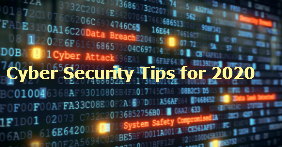1. Don’t underestimate the risks
The cybersecurity landscape is continually changing.What was low risk today could be high risk tomorrow. New malware may appear or a service that you use may get hacked or your password can be stolen. Update your risk security assessments frequently and stay abreast of emerging threats.
2. Don’t click on suspicious links
Spam in email and other messaging apps has become a part of everyday life. Sometimes it’s only a harmless ad, but other times it can be something more sinister. You might get an email coaxing you to click on a suspicious link to claim a prize or an offer that sounds too good to pass up might appear in an ad. If you have even a shred of doubt about it, don’t click. It just may contain malware that could wreak all kinds of lasting havoc on your computer.
3. Patching
Your computer is nagging you for the millionth time to install that latest update and you’ve hit the postpone button more times than you’ve snoozed your alarm. Your sleeping habits are your business, but you should always keep your devices updated to the latest version of software available. Remember, the majority of updates are security patches. The infamous WannaCry malware spread due to devices not being patched.
4. Don’t reuse your passwords
To simplify the task of memorising dozens of passwords, many people resort to reusing the same password on their various accounts. This means that they recycle the same password or passphrase, perhaps varying a character or two or by adding upon it. This approach should be avoided. If attackers figure out one of your passwords, password reuse allows them to guess the rest of your passwords.
5. Use 2FA
Two-factor authentication (2FA), sometimes known as multifactor authentication (MFA), is a simple way to add an extra layer of security to your accounts. The most common 2FA method used by popular online services is a text message with an authentication code sent to your phone. It is one of the most basic methods but use at least this one if you have no other option. If attackers are missing one piece of the puzzle, they cannot get in until they overcome that hurdle, which might make them look for an easier challenge elsewhere.
6. Set your router up securely
When it comes to home and small office internet connection, the router is the heart of your network. All your devices with an internet connection are linked to it, be it your smart TV, smartphone, personal computers or laptops. It is very common for people to just go through the bare necessities when installing it or keep the default settings pre-configured by the equipment vendor. You should always take the time to set your router up securely and change all default password for unique and complex ones.
7. Take care on unsecured public Wi-Fi
Lots of bars, cafes, restaurants, and shops offer complimentary Wi-Fi connections, which is a welcome alternative to using up your precious data plan. As convenient as this is, you should be careful what you connect to. An unsecured public Wi-Fi can lead to your private data being stolen or your device being hacked. Using a VPN is a good way to secure your data over these networks.
8. Use a VPN
Besides using a Virtual Private Network (VPN) to connect to your work’s servers, there are other security reasons to use one in private. You can use VPNs to access your home network remotely or to limit your ISP from seeing what you are doing, or to browse safely on public Wi-Fi. Depending on what you want to do, there are various types of VPNs you can choose from to protect your communication.
9. Don’t neglect security software
Whilst undoubtedly a necessity for participation in modern life, the internet comes with inherent dangers. You should always use reputable security software to protect your data. A firewall and anti-malware programs should be installed as a minimum. This doesn’t necessarily mean buying a separate program, facilities included in your computer’s operating system can be the best alternative. Make sure you configure it properly.
Clicking on the wrong link might lead to malicious code making its way to your computer. Security software provides multiple layers that can stop these threats in their tracks. Prevention is the mother of security; athletes in contact sports use mouthguards as a preventive measure because fixing their teeth is more expensive than protecting them. The same goes for your data.
10. Backup and encryption
If your computer breaks down or you become the victim of a ransomware attack, you will wish you had a backup. Always back up your sensitive data and things you have been working on recently; thus, if something does happen, you can continue unhindered by the unfortunate loss of your device. The same goes for encryption. Never underestimate the value of having your data encrypted: if you get hacked, the attacker will have a tough time getting to your data. If your device gets stolen, you have an extra layer of security in place before you can remotely wipe it.
If your small business needs help to implement cost effective security controls, please feel free to contact Krypsys via our contact page.

